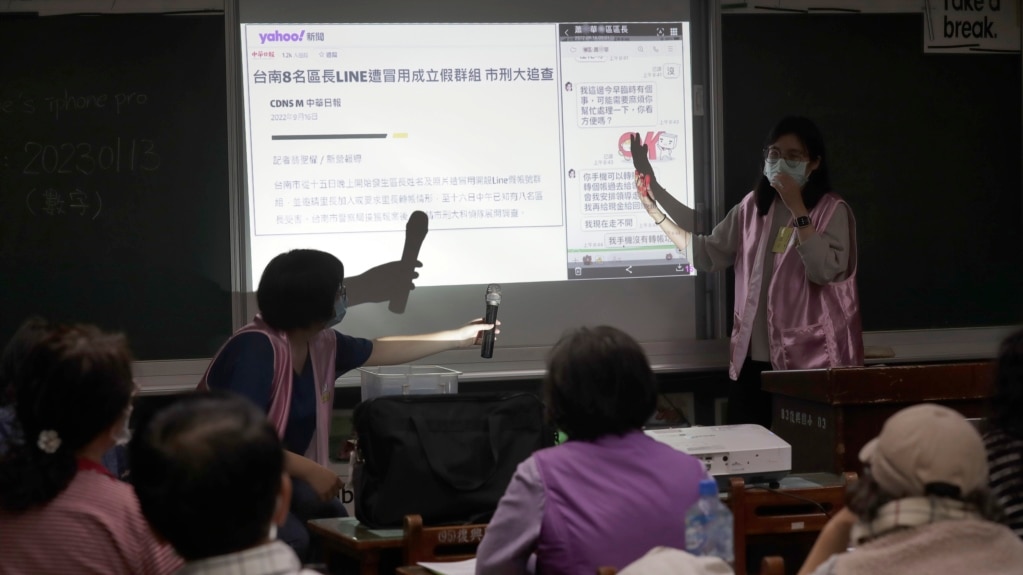Fake News Cleaner is one of several organizations in Taiwan that fights false information on the internet.
Other fact-checking groups include Co-facts, a bot that uses artificial intelligence (AI) to investigate information. A group of civic hackers founded that messaging service. Taiwan Fact Check Center and MyGoPen are also fact-checkers.
Yet these services operate with the understanding that users know basic things about the internet. They also assume that users can find a fact-checking website or add a bot to their computers.
Fake News Cleaner is different. It aims to reach old people and others who can be the least likely to understand current information technology. The group says it uses patience and respect while educating people about the algorithms and controls of the websites and services that they use.
Volunteers temporarily station at churches, temples or parks. The group offers free soap to connect people to the idea that the organization helps “clean” false information.
Fake News Cleaner talks to people, asking them about their lives and how they use media. They ask: How has fake news hurt you? They also teach methods that help in processing information. These can include looking at the logic behind some popular online theories or the facts behind the false stories that appear in the media.
The group has been operating for nearly six years. It has just one official employee and a team of volunteers. Fake News Cleaner has held more than 500 events. It has worked with college students, elementary-school children and especially with senior citizens, who, some say, are most affected by false information.
False stories
Like any democratic nation, Taiwan is flooded with different kinds of disinformation. It affects individuals personally. It targets the differences between generations. It also might involve making needless changes to services and devices in an effort to enlarge differences between users.
Melody Hsieh helped establish the group with Shu-Huai Chang in 2018. Hsieh said that for many people: “They have no way to communicate.” And she added, “This entire society is being torn apart, and this is a terrible thing.”
Hsieh said she was moved to act after seeing too many examples of division caused by fake news. For example, she said a married couple got divorced and a mother forced her child to leave her home because of fake news. Many stories of similar division and damage appeared in 2018 when Taiwan held national votes on disputed issues like nuclear energy, sex education and gay marriage.
Daily life and activities
Fake News Cleaner avoids political issues and does not take money from the government or political parties. It gives talks about everyday subjects like health, diet or fake advice about money meant to cheat people.
Twenty-eight-year-old teacher Tseng Yu-huan said the organization’s goal is to teach people to think about the information they are getting. “What we are dealing with is not about true or false,” Tseng said, “It’s actually about family relationships and tech.”
Tseng recently told a group at Bangkah Church about websites that gather or create stories without concern for the truth. He asks them: Is the person who wrote the story named? Who wrote the stories?
Tseng also points out that headlines of stories are sensational, targeting emotions like hatred, panic and surprise. They are meant to get people to “click” on them, which means more money for the website.
The young teacher was having a successful talk until he tried to show the group how to add a Line account for MyGoPen on their smartphones. Line is a popular service in Taiwan.
What might take a younger person one minute took much longer as the young teacher helped the older people in the room.
Moon Chen is Fake News Cleaner’s secretary-general. Chen said many older people receive costly phones from their children but do not know how to use them. The children fail to explain the basic use of the phone. That can cause problems. For example, algorithms usually present websites that the user has not followed. That can lead users to sites with bad information.
Lin Wei-Kun lives in Taipei and attended Tseng’s class. He said he knows better than to believe all the information online — especially claims for common foods that cure sickness.
“These days, there’s a lot of information online,” he said. Speaking of a common herb placed on foods, he said, “For example, cilantro is just a garnish. But if they write a post saying cilantro has these miraculous uses, a lot of people out there would believe it.”
I’m Mario Ritter Jr.
And I'm Caty Weaver.

